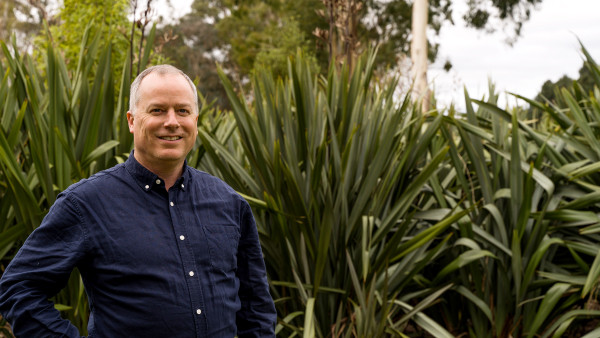
Dr Brent Barrett
Brent Barrett opened his office door and ran down the hallway arriving outside Saman Bowatte’s office slightly out of breath.
The day before Saman had sent him a quick email, “have a look” with a link to a new study showing how nitrous oxide emissions from wheat farming can be knocked down by plant breeding. It was this paper that sent Brent on a sprint to see Saman. As Brent recalls: “I was pretty excited”.
The two researchers work down the corridor from each other at the AgResearch Grasslands campus and while they have different specialities, they regularly compare notes on what’s new and exciting.
A recurring theme in conversations over recent years had been the possible benefits of Biological Nitrification Inhibition in New Zealand farming, or BNI for short.
While there had been research in the area, it hadn’t crystalised until this paper was discovered, and Brent arrived post haste outside Saman’s door.
“I did, I literally ran down the corridor to Saman’s office,” Brent remembers.
“He is my main collaborator in this space and we have been telling each other the same thing – that we need to look into providing BNI in pastures here in New Zealand. There was a palpable level of excitement when we saw the kind of evidence in the paper that really confirmed what this could mean for New Zealand and New Zealand farmers.”
BNI is the natural ability of certain plant species to release nitrification inhibitors from their roots. Nitrous Oxide emissions generated by New Zealand agriculture make up a large part of our overall greenhouse gas emission profile.
“[BNI] is very much a working with nature type of paradigm. Consumers really value having those kind of natural approaches and natural food systems. And if you can deliver something to a farmer that's already embedded in a seed that they're going to go ahead and plant in their pasture? It saves them a whole lot of effort.
The science behind naturally occurring BNI and their impact on the ecology is growing and AgResearch is playing its part.
Brent is a plant scientist and Saman specialises in soil and microbe interactions. They have just finished a Discovery scoping project (using their inter-disciplinary skills) to gauge whether BNI can be used in a New Zealand farming context, growing hydroponic assays relevant New Zealand plant specimens, such as ryegrass, and mixed them with ammonia oxidizing bacteria, one of the main protagonists in the nitrification process.
Several showed natural biological nitrification inhibition properties.
Brent says if the preliminary results are confirmed in field trials it “is an opportunity here for farming to get on to a much more sustainable footing. And to do so in a way that protects profitability and protects productivity. We need to identify the traits and bring that into host plants in a New Zealand pasture forage context, to look at some of the relatives of ryegrass and some ryegrasses themselves to see what was going on there.
“The knock down in nitrous oxide emissions in urine patches in tropical grasslands with BNI species is showing results of 50% or over, which is substantial. Numbers like that is one of the things that's really motivated us to look at this in a temperate pasture system.
“Also, in our preliminary experiments, on modern New Zealand ryegrass cultivars, some of the individual plants within those cultivars showed a surprising level of activity in the BNI assays. We were surprised and were not expecting that. So that's opened up another line of inquiry for us to say, is part of the solution actually sitting right under our noses?”
The next stage of the research will leverage off previous research on tropical systems and the
Global Research Alliance (GRA) has agreed to fund more research to progress some of the work on temperate grass species.
Also, AgResearch and Massey University were recently provided with $200,000 by the Centre for Climate Action on Agricultural Emissions to research the BNI effects of plantain.
We will report on any progress made in future newsletters.
Our results so far have been shared with our stakeholders and Brent said: “The response from stakeholders that we have spoken with in this space has been really positive. We've had good conversations with DairyNZ and with Fonterra and with a number of seed industry partners. So I think there is a stakeholder appetite here.”